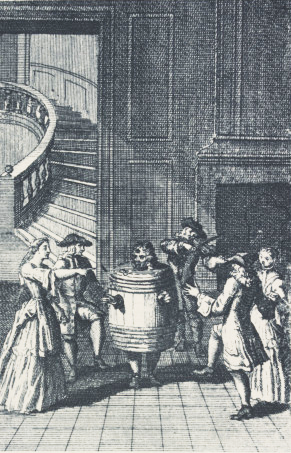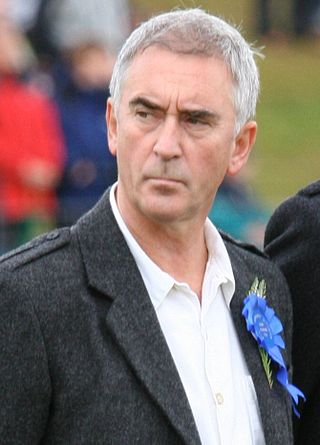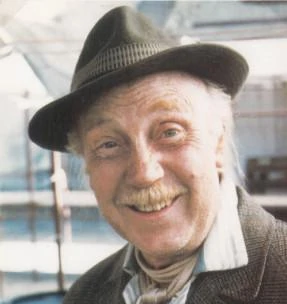Related Research Articles

"Restoration comedy" is English comedy written and performed in the Restoration period of 1660–1710. Comedy of manners is used as a synonym for this. After public stage performances were banned for 18 years by the Puritan regime, reopening of the theatres in 1660 marked a renaissance of English drama. Sexually explicit language was encouraged by King Charles II (1660–1685) personally and by the rakish style of his court. Historian George Norman Clark argues:
The best-known fact about the Restoration drama is that it is immoral. The dramatists did not criticize the accepted morality about gambling, drink, love, and pleasure generally, or try, like the dramatists of our own time, to work out their own view of character and conduct. What they did was, according to their respective inclinations, to mock at all restraints. Some were gross, others delicately improper.... The dramatists did not merely say anything they liked: they also intended to glory in it and to shock those who did not like it.

Thomas Betterton, the leading male actor and theatre manager during Restoration England, son of an under-cook to King Charles I, was born in London.

William Arnold Ridley, OBE was an English playwright and actor, earlier in his career known for writing the play The Ghost Train and later in life in the British television sitcom Dad's Army (1968–1977) as the elderly bumbling Private Godfrey, as well as in spin-offs including the feature film version and the stage production.
The King's Men was the acting company to which William Shakespeare (1564–1616) belonged for most of his career. Formerly known as the Lord Chamberlain's Men during the reign of Queen Elizabeth I, they became the King's Men in 1603 when King James I ascended the throne and became the company's patron.

The Theatre Royal, Drury Lane, commonly known as Drury Lane, is a West End theatre and Grade I listed building in Covent Garden, London, England. The building faces Catherine Street and backs onto Drury Lane. The present building, opened in 1812, is the most recent of four theatres that stood at the location since 1663, making it the oldest theatre site in London still in use. According to the author Peter Thomson, for its first two centuries, Drury Lane could "reasonably have claimed to be London's leading theatre". For most of that time, it was one of a handful of patent theatres, granted monopoly rights to the production of "legitimate" drama in London.

Denis Stamper Lawson is a Scottish actor. He is best known for his roles as Wedge Antilles in the original Star Wars trilogy (1977–1983) and as John Jarndyce in the television miniseries Bleak House (2005), the latter of which earned him BAFTA Award and Primetime Emmy Award nominations. He also appeared in the television series The Kit Curran Radio Show (1984–1986), Holby City, and New Tricks (2012–2015), and reprised the role of Antilles in the film Star Wars: The Rise of Skywalker (2019).

Leonard Pearce was an English actor who worked in theatre and television. He was perhaps best known for playing Grandad in the BBC television series Only Fools and Horses, from 1981 until his death in December 1984.

Robert Wilks was a British actor and theatrical manager who was one of the leading managers of Theatre Royal, Drury Lane in its heyday of the 1710s. He was, with Colley Cibber and Thomas Doggett, one of the "triumvirate" of actor-managers that was denounced by Alexander Pope and caricatured by William Hogarth as leaders of the decline in theatrical standards and degradation of the stage's literary tradition.

The Dorset Garden Theatre in London, built in 1671, was in its early years also known as the Duke of York's Theatre, or the Duke's Theatre. In 1685, King Charles II died and his brother, the Duke of York, was crowned as James II. When the Duke became King, the theatre became the Queen's Theatre in 1685, referring to James' second wife, Mary of Modena. The name remained when William III and Mary II came to the throne in 1689.
The King's Company was one of two enterprises granted the rights to mount theatrical productions in London, after the London theatre closure had been lifted at the start of the English Restoration. It existed from 1660 to 1682, when it merged with the Duke's Company to form the United Company.

Benjamin John Whitrow was a British actor. He was nominated for the BAFTA TV Award for Best Actor for his role as Mr Bennet in the 1995 BBC version of Pride and Prejudice, and voiced the role of Fowler in the 2000 animated film Chicken Run. His other film appearances include Quadrophenia (1979), Personal Services (1987) and Bomber (2009).
George Seton, 4th Earl of Winton was a Scottish Royalist, Privy Councillor, and Sheriff of Haddingtonshire.

The Duke's Company was a theatre company chartered by King Charles II at the start of the Restoration era, 1660. Sir William Davenant was manager of the company under the patronage of Prince James, Duke of York. During that period, theatres began to flourish again after they had been closed from the restrictions throughout the English Civil War and the Interregnum. The Duke's Company existed from 1660 to 1682, when it merged with the King's Company to form the United Company.

The United Company was a London theatre company formed in 1682 with the merger of the King's Company and the Duke's Company.

Cave Underhill (1634–1710?) was an English actor in comedy roles.
Edward Welsford Rowsell Howell, also known as pen name E.R. Howell, Edward Welsford Rowsell and Teddy/Ted Howell was a British Australian, character actor, radio and theatre producer, director and scriptwriter, theatre founder and drama teacher.
John Bowman (1651–1739) was a British stage actor. He began his career in the Duke's Company at the Dorset Garden Theatre. In 1692, he married Elizabeth Watson, who acted under the name Elizabeth Bowman. He later switched to act at the Drury Lane Theatre. He is also referred to as John Boman.
Joseph Williams was an English stage actor of the seventeenth and early eighteenth century.
Charlotte Butler was an English stage actress and singer of the seventeenth century. She may have joined the Duke's Company in the 1670s, but her first definite recorded performance was in Aphra Behn's The Revenge (1680) The anonymous A Satyr on The Players describes her,
Joseph Harris was a British actor and dramatist.
References
![]() This article incorporates text from a publication now in the public domain : Knight, Carlile, James (d.1691) (1887). "Bonnor, Charles". In Stephen, Leslie (ed.). Dictionary of National Biography . Vol. 09. London: Smith, Elder & Co.
This article incorporates text from a publication now in the public domain : Knight, Carlile, James (d.1691) (1887). "Bonnor, Charles". In Stephen, Leslie (ed.). Dictionary of National Biography . Vol. 09. London: Smith, Elder & Co.{{cite encyclopedia}}: CS1 maint: multiple names: authors list (link) CS1 maint: numeric names: authors list (link)